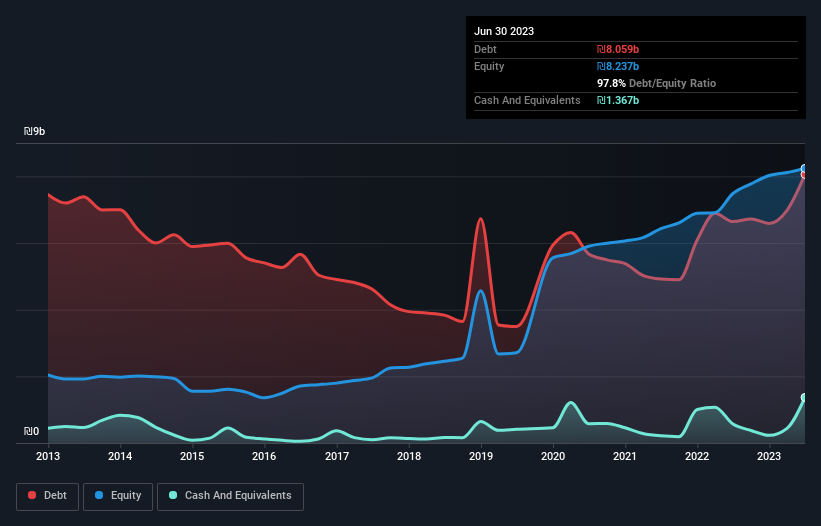- Israel
- /
- Real Estate
- /
- TASE:MVNE
Mivne Real Estate (K.D) (TLV:MVNE) Has A Somewhat Strained Balance Sheet
Legendary fund manager Li Lu (who Charlie Munger backed) once said, 'The biggest investment risk is not the volatility of prices, but whether you will suffer a permanent loss of capital.' So it seems the smart money knows that debt - which is usually involved in bankruptcies - is a very important factor, when you assess how risky a company is. We can see that Mivne Real Estate (K.D) Ltd (TLV:MVNE) does use debt in its business. But is this debt a concern to shareholders?
When Is Debt A Problem?
Debt assists a business until the business has trouble paying it off, either with new capital or with free cash flow. Part and parcel of capitalism is the process of 'creative destruction' where failed businesses are mercilessly liquidated by their bankers. However, a more common (but still painful) scenario is that it has to raise new equity capital at a low price, thus permanently diluting shareholders. Of course, debt can be an important tool in businesses, particularly capital heavy businesses. The first thing to do when considering how much debt a business uses is to look at its cash and debt together.
View our latest analysis for Mivne Real Estate (K.D)
What Is Mivne Real Estate (K.D)'s Debt?
As you can see below, at the end of June 2023, Mivne Real Estate (K.D) had ₪8.06b of debt, up from ₪6.64b a year ago. Click the image for more detail. However, because it has a cash reserve of ₪1.37b, its net debt is less, at about ₪6.69b.

How Strong Is Mivne Real Estate (K.D)'s Balance Sheet?
We can see from the most recent balance sheet that Mivne Real Estate (K.D) had liabilities of ₪1.03b falling due within a year, and liabilities of ₪9.22b due beyond that. Offsetting these obligations, it had cash of ₪1.37b as well as receivables valued at ₪190.1m due within 12 months. So its liabilities outweigh the sum of its cash and (near-term) receivables by ₪8.70b.
Given this deficit is actually higher than the company's market capitalization of ₪7.20b, we think shareholders really should watch Mivne Real Estate (K.D)'s debt levels, like a parent watching their child ride a bike for the first time. In the scenario where the company had to clean up its balance sheet quickly, it seems likely shareholders would suffer extensive dilution.
We use two main ratios to inform us about debt levels relative to earnings. The first is net debt divided by earnings before interest, tax, depreciation, and amortization (EBITDA), while the second is how many times its earnings before interest and tax (EBIT) covers its interest expense (or its interest cover, for short). The advantage of this approach is that we take into account both the absolute quantum of debt (with net debt to EBITDA) and the actual interest expenses associated with that debt (with its interest cover ratio).
With a net debt to EBITDA ratio of 8.7, it's fair to say Mivne Real Estate (K.D) does have a significant amount of debt. But the good news is that it boasts fairly comforting interest cover of 5.9 times, suggesting it can responsibly service its obligations. We saw Mivne Real Estate (K.D) grow its EBIT by 8.5% in the last twelve months. That's far from incredible but it is a good thing, when it comes to paying off debt. When analysing debt levels, the balance sheet is the obvious place to start. But it is Mivne Real Estate (K.D)'s earnings that will influence how the balance sheet holds up in the future. So if you're keen to discover more about its earnings, it might be worth checking out this graph of its long term earnings trend.
Finally, while the tax-man may adore accounting profits, lenders only accept cold hard cash. So the logical step is to look at the proportion of that EBIT that is matched by actual free cash flow. Over the most recent three years, Mivne Real Estate (K.D) recorded free cash flow worth 61% of its EBIT, which is around normal, given free cash flow excludes interest and tax. This free cash flow puts the company in a good position to pay down debt, when appropriate.
Our View
Mulling over Mivne Real Estate (K.D)'s attempt at managing its debt, based on its EBITDA,, we're certainly not enthusiastic. But on the bright side, its conversion of EBIT to free cash flow is a good sign, and makes us more optimistic. Looking at the balance sheet and taking into account all these factors, we do believe that debt is making Mivne Real Estate (K.D) stock a bit risky. Some people like that sort of risk, but we're mindful of the potential pitfalls, so we'd probably prefer it carry less debt. There's no doubt that we learn most about debt from the balance sheet. However, not all investment risk resides within the balance sheet - far from it. For example Mivne Real Estate (K.D) has 4 warning signs (and 1 which is a bit concerning) we think you should know about.
When all is said and done, sometimes its easier to focus on companies that don't even need debt. Readers can access a list of growth stocks with zero net debt 100% free, right now.
New: Manage All Your Stock Portfolios in One Place
We've created the ultimate portfolio companion for stock investors, and it's free.
• Connect an unlimited number of Portfolios and see your total in one currency
• Be alerted to new Warning Signs or Risks via email or mobile
• Track the Fair Value of your stocks
Have feedback on this article? Concerned about the content? Get in touch with us directly. Alternatively, email editorial-team (at) simplywallst.com.
This article by Simply Wall St is general in nature. We provide commentary based on historical data and analyst forecasts only using an unbiased methodology and our articles are not intended to be financial advice. It does not constitute a recommendation to buy or sell any stock, and does not take account of your objectives, or your financial situation. We aim to bring you long-term focused analysis driven by fundamental data. Note that our analysis may not factor in the latest price-sensitive company announcements or qualitative material. Simply Wall St has no position in any stocks mentioned.
About TASE:MVNE
Mivne Real Estate (K.D)
Operates as a real estate development company in Israel, Switzerland, Ukraine, North America, and France.
Acceptable track record with low risk.
Similar Companies
Market Insights
Community Narratives


Recently Updated Narratives


The Quiet Giant That Became AI’s Power Grid


Nova Ljubljanska Banka d.d will expect a 11.2% revenue boost driving future growth


The AI Infrastructure Giant Grows Into Its Valuation
Popular Narratives


The company that turned a verb into a global necessity and basically runs the modern internet, digital ads, smartphones, maps, and AI.


MicroVision will explode future revenue by 380.37% with a vision towards success



